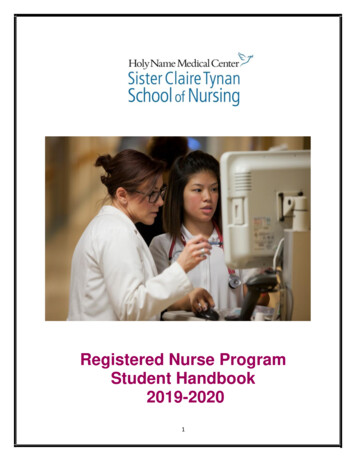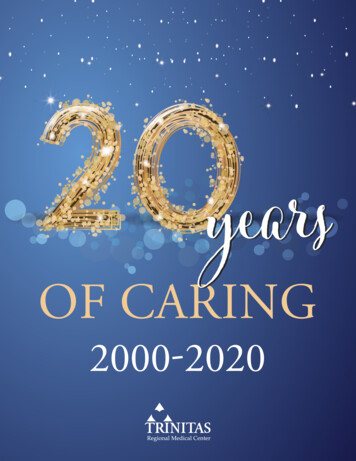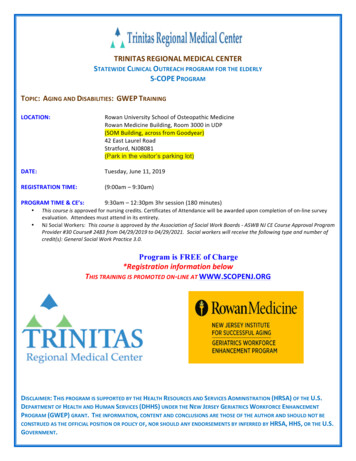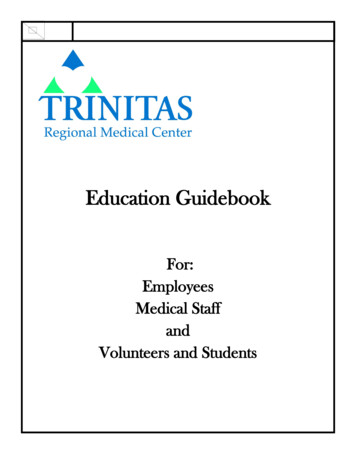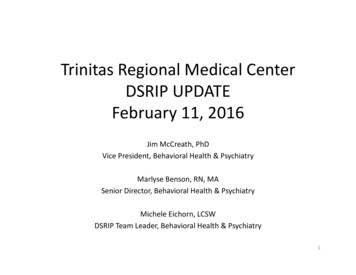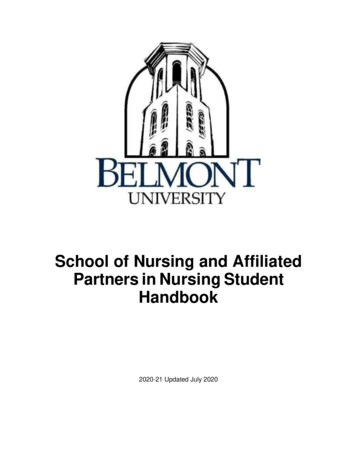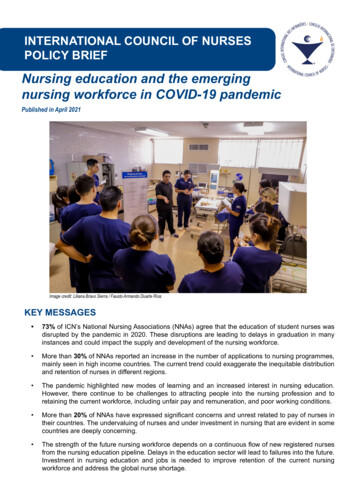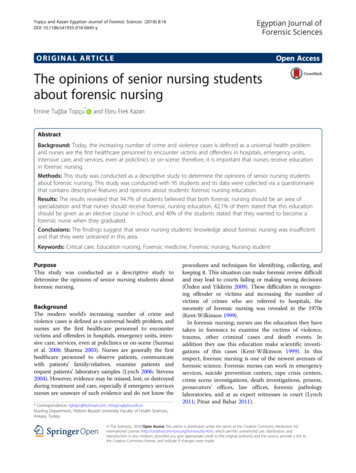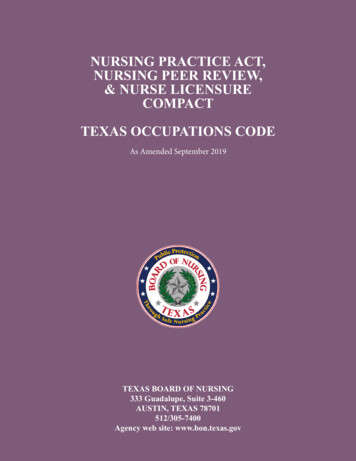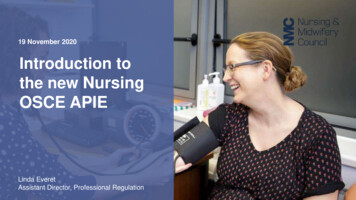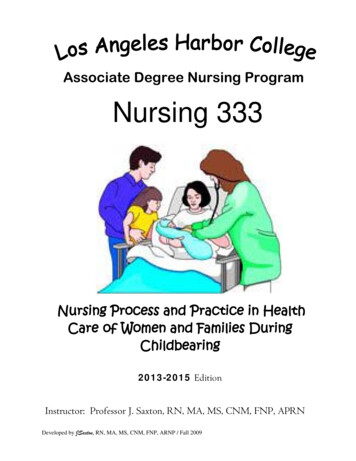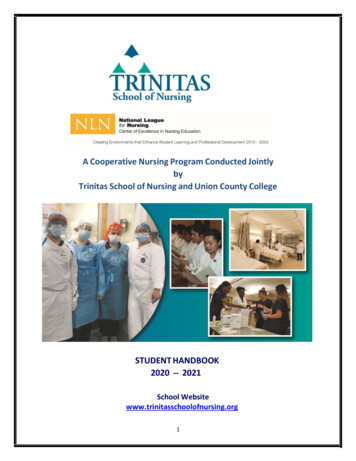
Transcription
A Cooperative Nursing Program Conducted JointlybyTrinitas School of Nursing and Union County CollegeSTUDENT HANDBOOK2020 -- 2021School Websitewww.trinitasschoolofnursing.org1
Student ResponsibilityIt is the student’s responsibility to become thoroughly familiar with the Trinitas School ofNursing Student Handbook and to comply with the provisions as written. The rules and regulationsset forth in this publication constitute students’ rights and responsibilities, as well as outlining therequirements for admission, retention and the degree requirements for the nursing program.The School of Nursing has stringent requirements for admission and retention that takespriority over the Union County College General Catalog minimum requirements. This publication isreviewed and revised each academic year. The current Student Handbook becomes effective on thefirst day of the new semester.Students will be notified if there are changes to program policies applicable to all studentsregardless of date of admission to the nursing program. This publication contains information validfor 2020-2021 academic year. A copy of the current Student Handbook can be accessed on the homepage of the School’s website, www.trinitasschoolofnursing.orgAll School of Nursing rules, regulations, policies, and procedures are subject to change. Failureto read this or other school of nursing or college publications does not excuse the student fromknowing the rules and regulations in effect at the School of Nursing or college at the time ofenrollment.Notice of School of Nursing policy changes during the academic year are posted in theCommunity shell section of the Learning Management System (CANVAS) in the “Memo from theDean” folder. Additionally, policy changes may be posted in the bulletin board outside of the Learningand Simulation Center (LSC) and the SNA Newsletter.2
Table of ContentsTopicPageWelcome from the Dean7Anti-Discrimination Policy; Title IX Policy8Student Code of Conduct8Right to Make Changes9School Philosophy9School Goals10End of Program Student Learning Outcomes11Program Outcomes11Accreditation12Curriculum Tracks13Course Descriptions14School of Nursing Grading Policies18Incomplete Grades20Transfer Credit20Campus Safety20Medical Emergencies20Parking21TSON Address and Office Hours22Change of Name and Address22Family Educational Rights and Privacy Act ( FERPA )22Tuition and Fees26Financial Aid Information27School of Nursing Scholarships28Student Financial Obligation29Academic Advising303
Table of ContentsTopicPageTranscripts30Bookstore Hours30Inclement Weather (School closing) Policy30Emergency Notification Process31Smoking Policy31Registration – Nursing Courses31Student Nurses’ Association (SNA)32Student Support Program ( SSP )32STEPS Program33Learning Resources34Student Input into Curriculum36Communities of Interest input into TSON36Special Requirements of TSONRN Licensure Requirements36NCLEX-RN Exam37Admission to TSON38Generic Track Admission38LPN-RN Track Admission39Essential Functions of Nursing39Students Requesting Disability Services42Students Requesting Testing Accommodations42Mandatory Requirements for Clinical43CPR Training43Criminal Background Check44Urine Drug Testing44Malpractice Liability Insurance44Student Health Requirement454
Table of ContentsTopicPageTB Screening45FLU Vaccine46TRMC Mandatory Education Module46Student Injury or Illness46TSON PoliciesAttendance46Learning Simulation Center ( LSC )47Canvas Learning Management System (LMS - Canvas)47Theory Class Policy48Clinical Policy48Student Injury During Clinical50Uniform Dress Code50Zero Tolerance Policy51Student Conduct52Student Code of Conduct52Student Rights and Responsibilities53Use of Social Media54Electronic Communication54Personal Electronics and Cell Phone Use55NURE Course Withdrawal55Curriculum Progression56NURE Course Re-entry56Readmission to the Nursing Program59Graduation Requirements59Convocation/Graduation Ceremonies59Academic Honors60Exam Make-Up Policy605
Table of ContentsTopicPageExam Administration Policy60Calculator Use62Exam Review Policy62Incomplete Grades for NURE Courses63Student Grievance/Complaint Policy64Student Appeal Policy64Academic Probation Policy65Clinical Warning Policy66Dismissal Policy666
Welcome from the DeanWelcome to the 2020-2021 Academic Year! The Trinitas School of Nursing Student Handbookprovides vital information to help students understand expectations while attending the School ofNursing. The Student Handbook also includes important School of Nursing policies and procedureswhich all students should be familiar with.All enrolled nursing students are held accountable to the School of Nursing requirements,policies and procedures outlined in the Student Handbook for the current academic year. All studentsare required to read the handbook and provide documentation that certifies that they have beeninformed of School of Nursing policies and procedures.I look forward to working with you to achieve your goal of becoming a registered professionalnurse. The faculty, school administration and staff are available to assist you in achieving successfuloutcomes throughout the nursing program.Sincerely,Roseminda N. Santee, DNP, MA, RN, NEA-BC, CNE, ANEFDean, Trinitas School of NursingDean Santee and Faculty at NJLN Convention April 20197
General InformationAnti-Discrimination PolicyTrinitas School of Nursing does not discriminate on the basis of race, color, national origin, sex,sexual orientation, marital status, religion, age, disability, handicap, or other legally protectedstatus in its provision of employment, education and activities, or other services.Title IX PolicyTitle IX is U.S. federal law that prohibits discrimination on the basis of sex in educationinstitutions, including Union County College. Title IX states, “No person in the United States shall, onthe basis of sex, be excluded from participation in, be denied the benefits of, or be subjected todiscrimination under any education program or activity receiving Federal financial assistance.” Sex discrimination includes sexual harassment and sexual violence, including sexual assault.Title IX can be found in the Education Amendments of 1972, 20 U.S.C. §1681, and itsimplementing regulations at 34 C.F.R. Part 106 (Title IX).Union County College policy prohibits discrimination, sexual harassment, and sexualmisconduct, including sexual assault, stalking, and dating violence. Union County College isrequired to name a Title IX Coordinator to oversee all activities related to compliance with TitleIX.All faculty, students, staff and College visitors who have a Title IX-related concern or wish to filea complaint for investigation may contact one of the following Coordinators: Director of Human Resources MacDonald Hall (A-219) Union County College 1033 SpringfieldAvenue, Cranford, NJ 07016 908-709-7046 Mr. Mensah Peterson Dean of Students, Deputy Title IX Coordinator Student Services Center(SD 121) 1033 Springfield Avenue, Cranford, NJ 07016 908-709-7516mensah.peterson@ucc.eduStudent Code of ConductThe use, possession, or distribution of an illegal drug, substance, or alcohol is not permittedon the School of Nursing, College, or Medical Center premises. In addition, weapons of any kindare not allowed on School, College or Medical Center premises for any reason. Any student violatingfederal, state, or local regulations may also be subject to civil or criminal action.The Dean reserves the right to terminate the attendance of any student who does notmeet the requirements of health, discipline, or personal suitability for enrollment. This includes but isnot limited to cheating, plagiarism, harassment, and/ or violence in any form.8
Right to make ChangesThe School reserves the right to modify, alter or discontinue any of its courses, programs orservices. The School also reserves the right to change or modify any provision or policy when suchaction serves the interest of the School or its students. A student at the School of Nursing is normallybound by the curriculum and the specific course requirements in effect upon his/her matriculation.The School is not responsible for course cancellations that may alter a student’s progression in theprogram. The School reserves the right to cancel any course with insufficient enrollment.Trinitas School of Nursing Philosophy, Goals, and Program OutcomesPhilosophy of the School of NursingThe faculty of the Trinitas School of Nursing, in keeping with the mission of Trinitas Health, iscommitted to providing a high-quality nursing education program to a diverse populationrepresentative of the community it serves. The School is a part of this community and the facultybelieves that it has a responsibility to be aware of and responsive to the health needs of its members.The Faculty and students interact with members of the community to assist them in meeting identifiedhealth needs.Recognizing the challenges that result from continual changes in the structure and delivery ofhealthcare; the varying complexities of health conditions; the variety of healthcare settings; and theexplosion of health information and technology, the School is fortified by a culture of integrity andexcellence in its commitment to educate students who will be prepared to face these challenges with aspirit of fairness, justice, community service, social responsibility for others, and the courage to beinnovative.The Faculty believes that human beings are complex, rational, spiritual beings. Inherent in thehuman condition is one’s right to dignity and value in every stage and condition of life. Human beingshave created complex social systems in which they interact with each other to protect, nurture andeducate their members. Human beings exist, with varying degrees of independence, in many contextsas members of families, communities and society. Individuals are capable of using their intellects totake deliberate actions directed toward maintaining life, health and wellbeing of self, society and theirenvironment. Human beings are accountable for their actions.Health is a dynamic state that is influenced by an individual’s reciprocal interaction with theenvironment. Individuals possess their own personal cultural definition of health that may differ fromthe beliefs of the people with whom they come in contact. Further, it is the Faculty’s belief that accessto health care is a basic right of all individuals.9
Nursing is an art and a science characterized by interpersonal, therapeutic and evaluativeprocesses. It is based on a body of nursing knowledge and research and makes use of the natural andbehavioral sciences. An essential element of nursing practice is caring. Nursing’s goal is to collaboratewith the client and family, assisting them in the acquisition of knowledge and abilities necessary toachieve the highest possible level of health.Using critical thinking and clinical judgment the nurse assesses, analyzes, diagnoses and treatscommonly occurring human responses to actual and potential health problems, providing a holisticresponse to the complex health needs of human beings. The nurse engages in collaborativerelationships with members of the healthcare team in order to provide the range of professionalnursing services that the client, family and groups may require. The nurse respects and interacts with adiverse population in a variety of settings within the community.Teaching/learning is an interactional lifelong process. During the learning process, studentsintegrate new and previously held knowledge and beliefs to form insights and ideas that empowerthem to think critically and make clinical decisions that are appropriate to thesituation. Reflecting the belief that students learn differently, the faculty guides the student to utilize avariety of learning strategies and resources to facilitate the student's learning. Learning is a selfdirected activity with faculty members functioning as facilitators joining with the students in thereciprocal learning process.Students come to the School of Nursing with diverse backgrounds and differing strengths andexperiences. The School recognizes this diversity and therefore, provides opportunities to the qualifiedstudent to navigate the educational environment in order to maximize their individual potential wellbeyond their entry-level program. It is the responsibility of the School to provide an environment inwhich the student may successfully acquire the knowledge, skills and attitudes necessary to practice asa safe and effective entry level registered nurse.The graduate of the School is prepared to assume the role of a safe, caring, ethical beginninggraduate nurse with varying amounts of supervision. The graduate is capable of practicing within avariety of settings. It is the responsibility of the graduate to continue the learning process in order tomaintain competency or to advance to another level of practice. Graduates are responsible for beingaware of and responsive to population-focused health care as well as making meaningful contributionsto the profession of nursing and society.Trinitas School of Nursing GoalsThe School will:1. Graduate an entry level nurse who can practice in a variety of health care settings.10
2. Produce a graduate who is successful in passing the NCLEX-RN examination on the firstattempt.3. Engage in a contractual agreement with Union County College to offer the student a programthat leads to a Diploma in Nursing and an Associate in Science degree.4. Provide opportunities for seamless academic progression.5. Utilize existing facilities, institutions, and resources while seeking out opportunities forexpansion.6. Provide educational access to a diverse student population that is representative of thecommunity.7. Collaborate with community agencies to meet identified nursing education and/or health careneeds.Trinitas School of Nursing End of Program Student Learning OutcomesThe Graduate will:1. Provide compassionate and coordinated patient centered care recognizing the patient as thesource of control and as a full care partner with respect to their individual preferences, valuesand needs.2. Function effectively within nursing and inter-professional teams, fostering opencommunication, mutual respect, and shared decision-making to achieve quality patient care.3. Integrate best current evidence with clinical expertise and patient/family preferences andvalues when making clinical decisions in the delivery of optimal health care4. Use data to monitor the outcomes of care processes and use improvement methods to designand test changes to continuously improve the quality and safety of health care systems.5. Minimize risk of harm to patients and providers through both system effectiveness andindividual performance.6. Use information and technology to communicate, manage knowledge, mitigate error, andsupport decision making.Trinitas School of Nursing Program OutcomesFour (4) quality indicators are trended by semester and program track to demonstrateevidence that graduates are achieving identified competencies consistent with the Trinitas School ofNursing Philosophy, Student Learning and Program Outcomes and professional standards. Theprogram outcome information is publicly accessible from the Consumer Information page on theTrinitas School of Nursing website.1. Trinitas School of Nursing NCLEX-RN licensure examination pass rate will be at least 80% for allfirst-time test takers for the 12-month period January 1 – December 31st.2. 50% of the students who begin the first nursing course will graduate from the program within11
150% of the time frame allotted for the program track (Generic or LPN-RN).3. 80% of Trinitas School of Nursing graduates will report satisfaction with program effectivenessas agree or strongly agree as per the Graduate Survey.4. 80% of Trinitas School of Nursing graduates who are seeking employment will obtain a nursingposition within 12 months of graduation as per the Job Placement Survey.AccreditationThe Trinitas School of Nursing is approved and accredited by:New Jersey State Board of NursingPO Box 45010, Newark, New Jersey, ation Commission for Education in Nursing (ACEN)3343 Peachtree Road NE, Suite 850Atlanta, GA 30326404-975-5000www.acenursing.orgUnion County College is approved and accredited by:Middle States Commission on Higher Education3624 Market Street, Philadelphia, PA. 19104267-284-5000www.msche.orgThe School of Nursing is recognized by the National League for Nursing as a Center of Excellence inNursing Education in the category of Creating Environments that Enhance Student Learning andProfessional Development from 2008-2020.www.nln.org12
Curriculum TracksLPN to RN Track - Evening ClassesGeneric Track(Suggested sequence for full-time studentenrollment)Pre-requisitesCREDITSBIO 105 Anatomy & Physiology I . 4BIO 106 Anatomy & Physiology II . 4BIO 108 Microbiology . 4CHE 114 Chemistry . 4ENG 101 English Composition I . 3ENG 102 English Composition II . 3PSY 101 General Psychology . 3PSY 204 Life Span . 3SOC 101 Principles of Sociology . 3Humanities General Education . 6Licensed Practical Nurse Curriculum . 10SEMESTER ICREDITSBIO 105 Anatomy and Physiology I . 4CHE 114 Chemistry . 4ENG 101 English Composition I . 3NURE 130 Nursing Trends and Concepts . 4TOTAL 15SEMESTER IICREDITSBIO 106 Anatomy and Physiology II . 4PSY 101 General Psychology. 3NURE 131 . 8TOTAL 15LPN to RN Track - Evening Classes and ClinicalSEMESTER IIICREDITSBIO 108 Microbiology . 4PSY 204 Life Span. 3NURE 132 . 8TOTAL 15SEMESTER ICREDITSNURE 211 . 3NURE 212 . 4TOTAL 7SEMESTER IICREDITSNURE 250 . 6TOTAL 6SEMESTER IVCREDITSENG 102 English Composition II . 3SOC 101 Principles of Sociology . 3NURE 231 . 8TOTAL 14SEMESTER IIICREDITSNURE 260/270 . 6TOTAL 6SEMESTER VCREDITSNURE 232 . 8Humanities General Education . 6TOTAL14SEMESTER IVCREDITSNURE 280/290 . 6NURE 291 . 1TOTAL 7ENG 112 is an acceptable substitute for ENG 101 fornon-native speakers of EnglishCREDIT ALLOCATIONNursing . 36General Education . 37**TOTAL73**Generic Track students: Due to the rigorousnature of nursing curriculum courses, it isrecommended that if the full-time sequence ofcourses is chosen, students limit outside workobligations to support student success in the13
Trinitas School of NursingNursing Course DescriptionsGeneric TrackNURE 130 - Nursing Trends and ConceptsThis course introduces the student to the profession of nursing, its evolution, and current trendsand issues. The role of the nurse within the health care delivery system is incorporated throughoutthe course. Elements of normal nutrition are introduced. Nursing process is presented as the methodof formulating decisions and providing care in nurse-client interactions. The relationship of criticalthinking to clinical judgment is explored. An overview of nursing theories and health assessment ispresented. A review of basic math principles is conducted with later emph
Trinitas School of Nursing Philosophy, Goals, and Program Outcomes Philosophy of the School of Nursing The faculty of the Trinitas School of Nursing, in keeping with the mission of Trinitas Health, is committed to providing a high-quality nursing education program to a dive
